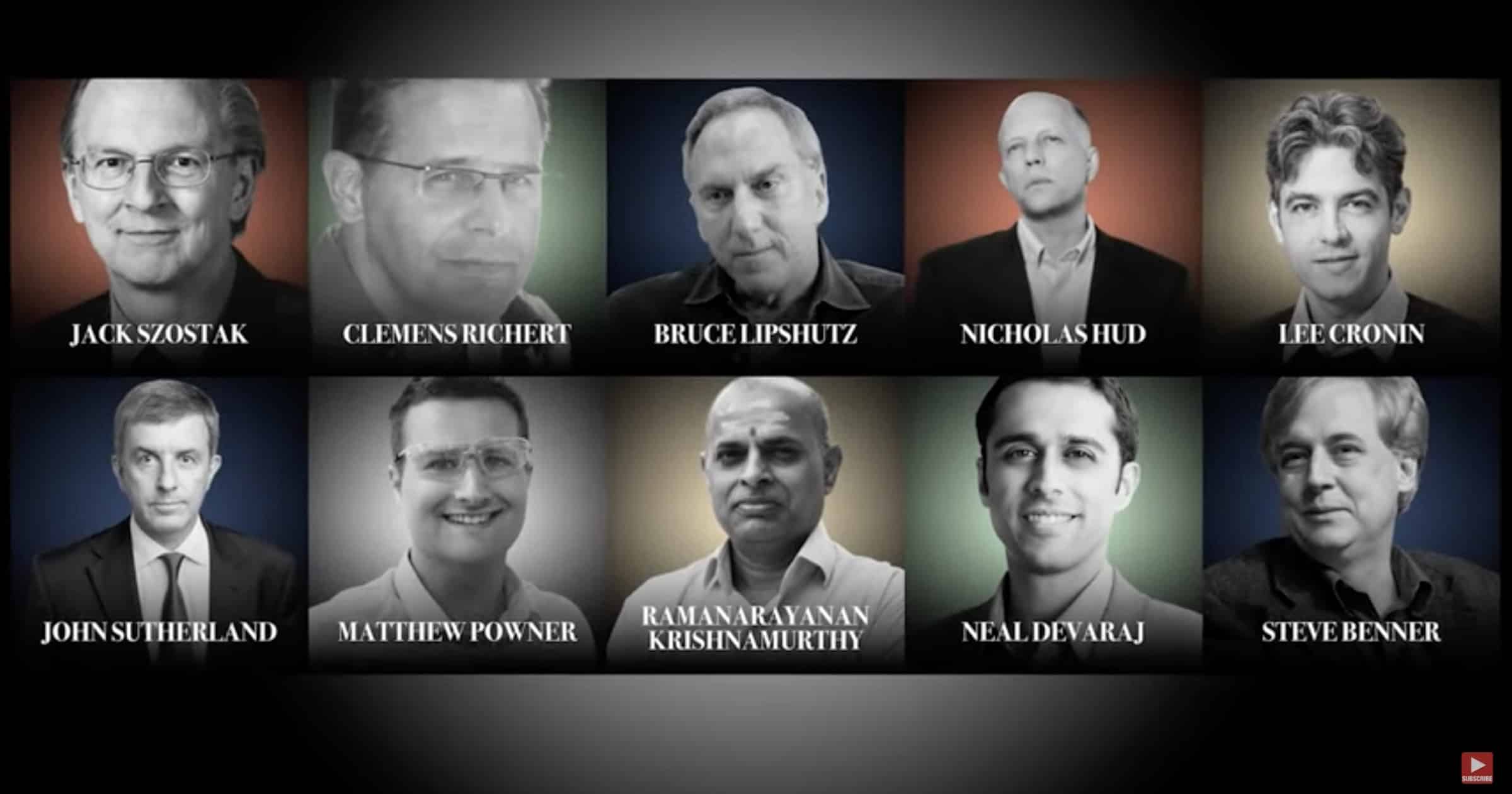View attachment 834098
Let's see an army of Dawkins' monkeys top this ! ! ! ! !
__________________________________
Thu 9/14/2023 11:35 AM
Hi John—
Your critique of the Dawkins weasel demonstration found its way to me, and I agree with it entirely. I offered my own critique in
Undeniable (p198-200). You hit the nail on the head!
Regrettably, even solid refutations of evolutionary arguments like this don’t seem to get their proponents to rethink their position. I’ve become convinced that this is because the root problem is spiritual, not scientific or intellectual.
Best regards,
Doug Axe
Douglas Axe, PhD
Rosa Endowed Chair of Molecular Biology
Professor of Computational Biology
Co-Director of Stewart Science Honors Program
School of Science, Technology & Health
Biola University
Weasel program - Wikipedia
In chapter 3 of his book
The Blind Watchmaker, biologist Richard Dawkins gave the following introduction to the program, referencing the well-known infinite monkey theorem.*
I don't know who it was first pointed out that, given enough time, a monkey bashing away at random on a typewriter could produce all the works of Shakespeare. The operative phrase is, of course, given enough time. Let us limit the task facing our monkey somewhat. Suppose that he has to produce, not the complete works of Shakespeare but just the short sentence 'Methinks it is like a weasel', and we shall make it relatively easy by giving him a typewriter with a restricted keyboard, one with just the 26 (capital) letters, and a space bar. How long will he take to write this one little sentence?
[NOTE: How lazy of Richard Dawkins to fail to look up the author of his monkey business. It was Sir Arthur Eddington.
In 1928, British astrophysicist Arthur Eddington presented a classical illustration of chance in his book, The Nature of the Physical World: “If I let my fingers wander idly over the keys of a typewriter it might happen that my screed made an intelligible sentence. If an army of monkeys were strumming on typewriters they might write all the books in the British Museum.”
This is nonsense compounding nonsense. And yet my high school math teacher presented this proposition to his classes in the 1960’s.
First, an “army of monkeys” wouldn’t be very interested in hitting typewriter keys repeatedly. There is nothing for them to gain in so doing.
Second, those who did hit the keys would quickly get to the end of the line, and have no concept of returning the carriage to type the second line.
Third, those very few who somehow overcame the first and second hurdles, repeatedly, would find that the paper was ejected from the carriage, and they are hopelessly unable to replace the first page with a fresh sheet of paper.
Fourth, we will never get to the fourth problem of exhausting the ink in the typewriter ribbons because the “army of monkeys” would have defecated on or otherwise ruined every typewriter.
Fifth, Sir Arthur Eddington never began to consider the statistics of monkeys “selecting” 1 out of approximately 100 different keys, counting upper and lower case of all letters, numbers, and punctuation marks. A page of an average book has 250 – 300 words. (https://hotghostwriter.com/blogs/blog/novel-length-how-long-is-long-enough)
*Finally, the largest army in the world is the People’s Liberation Army of Communist China, with over 2,000,000 troops. This is hardly “infinite” in number. (https://economictimes.indiatimes.com/)
The average word has 6.47 letters. (https://capitalizemytitle.com/character-count/100-characters/)
Using the lower value of 250 words, times 6.47 letters equals 1,617 characters in a page.
1/100 to the 1,617th power is 10-3,234, for just one page, much less “all the books in the British Museum.”
“we just think of one chance in 10 to the 40th power” as “impossible”. – Richard Dawkins, (The Blind Watchmaker, page 142)
Emil Borel, a famous statistician, defined “impossible” as an event with a probability of 10-50 or less.
https://owlcation.com/stem/Borels-Law-of-Probability
This is equivalent to finding one unique marble, in 78 spheres the size of our solar system out to Pluto, all full of identical marbles except for one, on your first and only attempt. You do not get an infinite number of attempts, not even two.
Therefore 1050 marbles, each 1cm in diameter, would occupy 78 spheres reaching from the center of the sun to Pluto, 5.906 billion kilometers from the sun. (105 marbles/km)3 = 1015 marbles per cubic km
To get 35 more orders of magnitude requires the multiplier of roughly (4.64 x 1011) cubed, for volume.
4.64x 1011 km/5.906 x 109 km= ~78.5 spheres the size of our solar system to Pluto]
Dawkins then goes on to show that a process of
cumulative selection can take far fewer steps to reach any given target. In Dawkins' words:
We again use our computer monkey, but with a crucial difference in its program. It again begins by choosing a random sequence of 28 letters, just as before ... it duplicates it repeatedly, but with a certain chance of random error – 'mutation' – in the copying. The computer examines the mutant nonsense phrases, the 'progeny' of the original phrase, and chooses the one which,
however slightly, most resembles the target phrase, METHINKS IT IS LIKE A WEASEL.
Generation 01: WDLTMNLT DTJBKWIRZREZLMQCO P
[2]
Generation 02: WDLTMNLT DTJBSWIRZREZLMQCO P
Generation 10: MDLDMNLS ITJISWHRZREZ MECS P
Generation 20: MELDINLS IT ISWPRKE Z WECSEL
Generation 30: METHINGS IT ISWLIKE B WECSEL
Generation 40: METHINKS IT IS LIKE I WEASEL
Generation 43: METHINKS IT IS LIKE A WEASEL
Dawkins continues:
The exact time taken by the computer to reach the target doesn't matter. If you want to know, it completed the whole exercise for me, the first time, while I was out to lunch. It took about half an hour. (Computer enthusiasts may think this unduly slow. The reason is that the program was written in BASIC, a sort of computer baby-talk. When I rewrote it in Pascal, it took 11 seconds.) Computers are a bit faster at this kind of thing than monkeys, but the difference really isn't significant. What matters is the difference between the time taken by
cumulative selection, and the time which the same computer, working flat out at the same rate, would take to reach the target phrase if it were forced to use the other procedure of
single-step selection: about a million million million million million years. This is more than a million million million times as long as the universe has so far existed.
[So much for Dawkins’ specious argument in defense of Darwinism, which he proudly claimed, “… made it possible to be an intellectually fulfilled atheist.” (http://UncommonDescent.com) Twenty-six capital letters plus the space bar equals twenty-seven. Twenty-seven to the twenty-eighth power equals ten to the fortieth different possible combinations, of which we seek only one specifically. Dawkins admits his definition of “impossible” is 1 chance in 10 to the 40th power. This is not for all of Shakespeare’s works, but for one short sentence, and even then on a dramatically altered keyboard, not of fifty possible keys, lower case, and fifty more keys, upper case, but for only twenty-six keys, all upper case.
Of critical but neglected importance is the fact that for “selection” to occur, the intermediary produced by the random mutation MUST confer a “selective advantage” for the host organism, otherwise it will be lost. It is therefore incumbent on the advocate for Darwinism to demonstrate, in each case, what that improvement is and how it operates, every single time, without exception. “Selection” requires no less. This is easily done when copying short sentences, but not so easily done when originally constructing over 20,000 proteins in humansa, the largest of which is titin, at 38,138b amino acid residues in length. 1 out of 20 amino acids “selected” consecutively 38,138 times has a probability of 1 chance in 1049,618. This is for only one protein. Calculating for chirality, i.e. the “selection” of L amino acids instead of D amino acidsc and all peptide bonds rather than the equally probable non-peptide bondsd reduces the probability of original naturalistic synthesis to 1 chance in 1072,578. Twenty thousand more proteins to go! – John Phillip Jaeger]
a - https://www.omim.org/entry/188840\
b - https://www.ncbi.nlm.nih.gov/pmc/articles/PMC4889822/
c - ½ to the 38,138 = 10-11,480
d - ½ to the 38,138 = 10-11,480

